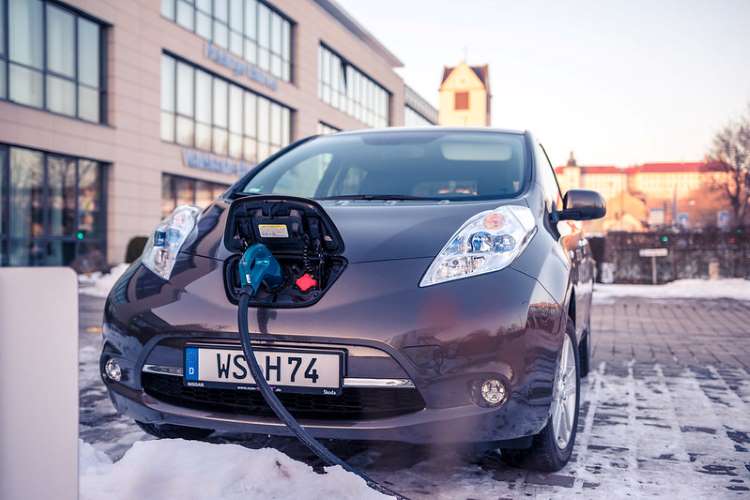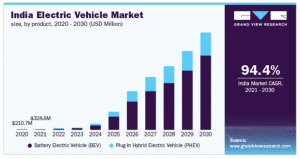
Electric vehicles seem to have captured the imagination of the country. Last year was the year of transformation for the latest sunshine industry – EVs. The sector picked up momentum after the initial shock of the pandemic. The evolution of the industry is happening alongside the increasing awareness and a willingness to take climate change seriously. The Indian market for electric passenger vehicles is seeing a boom even though it is still in an early stage. The EV manufacturers are confident of the future and are ramping up production to meet the rising demand.
MG Motor India is one such company which is looking to bolster production to 1.2 lakh units annually from the current 75,000 units. Meanwhile, Maruti Suzuki India looks to unveil its first EV in FY25. Kia, Mahindra & Mahindra, Hyundai are other entrants in the segment. Currently, two companies dominate the sector — homegrown Tata Motors and MG Motor. According to data released by the Federation of Automobile Dealers Association (FADA), MG sold 2,045 electric passenger vehicles in FY22 (11.5% market share) compared with 22.4% in FY21.
Tata Motors has a near monopoly on the nascent, yet burgeoning market. It retailed 15,198 vehicles in FY22, amounting to a market share of 85.4%. The company witnessed a 353% growth in sales in FY22 compared with FY21.
READ I Crimes against women: What causes the rise in gender-based violence
With electric cars segment showing impressive sales growth, both domestic and foreign car manufacturers such as Maruti Suzuki, Mahindra, Hyundai, BMW, Mercedes-Benz, and Audi are vying for a pie in the market. Industry analysts expect at least 20 electric vehicle models to be launched by next year.
While all players have great expectations from EVs, currently they have together just 1% of the domestic passenger vehicles market. The country sold 17,802 electric passenger vehicles units in FY22, against 4,984 units in FY21. To charge these vehicles, 2,826 public charging stations are currently operational.

Everyone has eyes on EVs
The government and the citizens have their eyes fixed on EVs, and rightly so. Fuel prices are hitting record highs, leaving commuters scrambling for cheaper mobility solutions. It is not that fuel is easily available. Because of greenhouse emissions, the world is also looking for cleaner modes of transport. Fossil fuels are one of the biggest source of carbon emissions in the country. In fact, India has some of the most polluted cities in the world. Obviously, EVs are full of promise in such a country.
Companies are also trying to emulate Tesla. The Elon Musk-led company’s plans to make inroads into India are in limbo over tax issues. Tesla is now believed to have put its plans to sell EVs in the country on hold, leaving the door wide open for competition to capitalise on the situation. These companies will likely have high net-worth Indian consumers as target.
Government support for electric vehicles
It comes as no surprise then that the government is also betting on electric mobility to make India carbon neutral and reduce dependency on fossil fuels. To incentivise manufacturers, it has also approved a PLI scheme worth 18,100 crore investments in battery manufacturing, and 26,058 crore for automotive manufacturing of EVs. Moreover, GST rates on EVs have been brought down from 12% to 5%.
READ I GDP growth: Indian economy faces global headwinds
The government’s support in the form of incentives and subsidies like FAME II and PLI (Production Linked Incentive) schemes has helped start-ups to enter the market. Moreover, companies such as Indian Oil Corporations have also made the news as they are to install 10000 plus charging stations.
Current hurdles
While electric vehicles make just about 1% of the country’s passenger vehicle market, it is a supply-side problem and not a demand-side issue. Even commerce and industry minister Piyush Goyal recently said that consumers are ready and in want of more options.
Currently, there is only mild-hybrid technology in mass-produced vehicles. While the country has availability of full hybrids, they are steeply priced. For instance, the Honda City eHV is priced upwards of Rs 20 lakh. Even Maruti Suzuki has said that its forthcoming launch will be in an upper-price band as it hopes to get good customer acceptance. To justify the price, the automaker said that they have been carefully designed and manufactured.
High acquisition cost and lack of ample charging infrastructure remain major issues. There is no data to inspire consumer confidence, especially on degradation of batteries. Experts in the area are of the opinion that electrification will only happen over the medium term when carmakers come out with newer models. Further, customers are also apprehensive due to range anxiety which is a driver’s fear that a vehicle will run out of power before finding a charging point.
The automotive industry was affected by the coronavirus pandemic and semiconductor shortages. The Ukraine-Russia war was another disruptor as commodity prices shot up, in turn, leading to an increase in the prices of passenger vehicles. However, industry insiders believe that some relief on these fronts can be expected in the near future.
